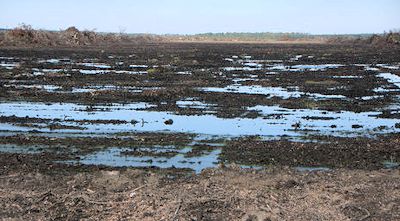MERRITT — A coastal environmental group is planning to notify two federal agencies today that it intends to sue them for not enforcing federal law to protect more than 250 acres of wetlands near this small Pamlico County community.
The N.C. Coastal Federation plans to send a letter to the U.S. Environmental Protection Agency and the Army Corps of Engineers telling them that they have 60 days to enforce provisions of the federal Clean Water Act that prevent the illegal ditching of wetlands. If no action is taken, the group intends to file a civil lawsuit in federal court.
Supporter Spotlight
The Clean Water Act, the main federal law that protects most wetlands, requires that agencies be given 60 days to respond to complaints before a lawsuit is filed.
 Todd Miller |
The federal government reported last year that about seven football fields of forested, coastal wetlands are lost every hour in the United States, noted Todd Miller, the federation’s executive director. “Lack of enforcement of existing wetland protection laws, such has recently occurred in Pamlico County, is a major cause for these unacceptable losses,” he said. “The N.C. Coastal Federation hopes to slow these losses by insisting that we enforce existing federal laws to protect these wetlands.”
The issue has festered since 251 acres on the south side of State Road 1324 were cleared last year. The land is part of a 4,600-acre tract owned by Spring Creek Farms LLC, an agricultural firm registered in Illinois. The company had intended to clear and farm the entire tract.
Local farmers first raised alarms that the cleared land was a wetland. Aerial photographs later showed that no ditches existed on the property before the early 1990s. Any extensive ditching through wetlands would have required a permit under the 1972 Clean Water Act, but the Corps, which enforces those provisions of the law, could find no evidence that permits had been issued.
Then came the Catch-22. Under pressure from the federation and local county commissioners, state and Corps regulators visited the site in August 2013 to determine whether the cleared land was a wetland under federal law. They found two of the three things the law requires: wetlands plants and soils. The land itself, though, was too dry, the Corps decided. It therefore wasn’t a wetland under the law, the agency said, and thus no permits were needed to clear it. EPA later concurred with that decision.
Supporter Spotlight
Miller contended that the ditches dug more than 20 years earlier apparently without permits so changed the hydrology that the tract is now no longer wet enough to meet one of the three permitting tests. “An illegal activity eliminated the permit requirement, and what the law was intended to prevent is now allowed,” he said. “That doesn’t seem to make much sense.”
 The Army Corps of Engineers doesn’t consider the cleared land to be wetlands. |
The Corps’ would agree, at least according to its internal wetlands manual, said Geoff Gisler, a senior attorney with the Southern Environmental Law Center in Chapel Hill. The center is representing the federation. In cases of past abuses, the manual requires that the Corps investigate when the ditching or filling took place to determine if a permit would have been required and if under natural conditions the land would be a wetland and currently subject to permitting, he explained.
“We’re asking the Corps and EPA to look at the entire historical record, to look at the aerial photographs to make those determinations,” Gisler said.
The federation, he said, wants the agencies to revise their assessment, assert jurisdiction over the 251-acre tract and issue an order requiring restoration of the converted wetlands. “Then there would be no need for a lawsuit,” Gisler said.
Allen Propst welcomes the action. He’s a real-estate agent in Pamlico County who was one of the first to draw attention to the land clearing. “I’m a black-and-white type of guy,” he said. “If someone is breaking the law they need to be stopped.”
The tract, he said, drains to the Neuse River and is the headwaters of at least 12 creeks. “Those wetlands are important to water quality. Once they’re gone, they’re gone forever,” Propst said. “We can’t turn our backs on this, and I’m very happy to hear that the N.C. Coastal Federation continues to lead the charge along with the Southern Environmental Law Center. The 60-day notice is the only way to get the agencies to respond.”







